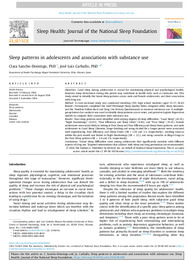Título :
Sleep patterns in adolescents and associations with substance use |
Autor :
Sancho-Domingo, Clara 
Carballo, José Luis  |
Editor :
Elsevier |
Departamento:
Departamentos de la UMH::Psicología de la Salud |
Fecha de publicación:
2024-10-23 |
URI :
https://hdl.handle.net/11000/33990 |
Resumen :
Objectives: Good sleep during adolescence is crucial for maintaining physical and psychological health;
however, sleep disturbance during this period may contribute to health risks, such as substance use. This
study aimed to identify the latent sleep patterns across male and female adolescents, and their association
with drug use.
Method: A cross-sectional study was conducted involving 1391 high school students (aged 15-17; 56.4%
female). Participants completed the brief Pittsburgh Sleep Quality Index alongside other sleep measures,
and the Timeline Follow-Back and Drug Use History Questionnaire to measure substance use. A multiplegroup latent class analysis was used to identify sleep patterns across sexes, and pairwise Logistic Regression
models to compare their association with substance use.
Results: Four sleep patterns were identified with varying degrees of sleep difficulties: "Good Sleep" (43.3%),
"Night Awakenings" (31.8%), "Poor Efficiency and Sleep Onset" (9.4%), and "Poor Sleep" (15.5%). Female
adolescents were more likely to belong to Poor Sleep and Poor Efficiency and Sleep Onset patterns, and male
adolescents to Good Sleep. Likewise, binge drinking and using alcohol for a longer period were associated
with experiencing Poor Efficiency and Sleep Onset (OR = 1.03 and 2.3, respectively); smoking tobacco
within the past month was linked to Night Awakenings (OR = 2.2); and using cannabis or illegal drugs to
the Poor Sleep pattern (OR = 2.4 and 2.6, respectively).
Conclusions: Varied sleep difficulties exist among adolescents that significantly correlate with different
aspects of drug use. Targeted interventions that address both sleep and drug prevention are recommended
|
Palabras clave/Materias:
Sleep patterns
Adolescents
Alcohol
Cannabis
Tobacco
Latent class analysis |
Área de conocimiento :
CDU: Filosofía y psicología: Psicología |
Tipo de documento :
info:eu-repo/semantics/article |
Derechos de acceso:
info:eu-repo/semantics/openAccess
Attribution-NonCommercial-NoDerivatives 4.0 Internacional |
DOI :
https://doi.org/10.1016/j.sleh.2024.09.002 |
Publicado en:
Sleep Health: Journal of the National Sleep Foundation, 2024 |
Aparece en las colecciones:
Artículos- Psicología de la Salud
|

 La licencia se describe como: Atribución-NonComercial-NoDerivada 4.0 Internacional.
La licencia se describe como: Atribución-NonComercial-NoDerivada 4.0 Internacional.
.png)